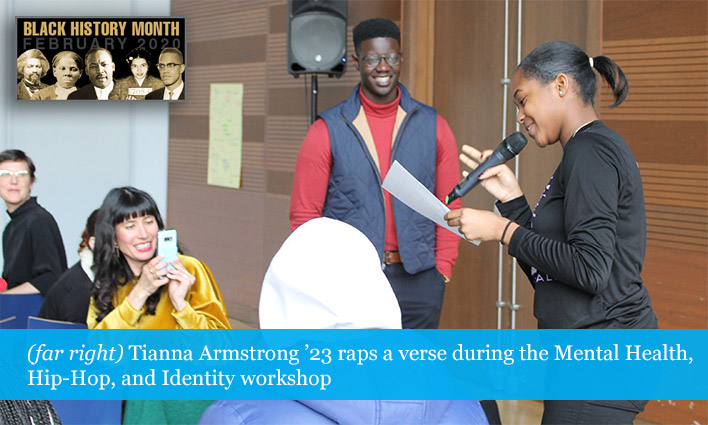
“The intersection of identity and hip-hop culture offers an entry point to discuss and engage with mental health in a way that is not often considered or explored.” —Crystal Leigh Endsley
Recognizing the need to remove the stigma surrounding mental health, particularly in communities of color, and as part of our Black History Month series of events, John Jay College hosted Mental Health, Hip-Hip, and Identity, on February 24. The interactive workshop, co-sponsored by the Africana Studies department, the Women's Center for Gender Justice, and the Center for Student Involvement and Leadership, sought to encourage our students to talk about mental health and wellness by using hip-hop as a tool. “The issue of mental health is critically important for everyone to think about, and especially for the students we serve here at John Jay,” said Crystal Leigh Endsley, Ph.D., Associate Professor of Africana Studies, adding that hosting the event during Black History Month was intentional. “The intersection of identity and hip-hop culture offers an entry point to discuss and engage with mental health in a way that is not often considered or explored. Hip-hop reaches and reflects the African diaspora; and, there is a stigma in communities of color about seeking support for mental health maintenance. We’re passionate about students exploring these issues and advocating for their well-being.”

During the workshop, students were guided by three hip-hop education scholars and writers—Ian Levy, Ph.D., Assistant Professor, Manhattan College; Lauren Kelly, Ph.D., Assistant Professor, Rutgers University; and Edmund Adjapong, Ph.D., Professor, Seton Hall University—to explore how hip-hop music and culture can shape identity, provide insight into people’s lives, and serve as an outlet for feelings, thoughts, and emotions.

After breaking into groups, students were asked to walk around Moot Court and answer questions that were taped to the walls. The exercise, called “Write Around the Room” was meant to get students thinking about how they define mental health and wellness. Questions included: What is mental health? What does it look like to be mentally well? What does it look like to be mentally unwell? And, what can we do to cultivate mental wellness in ourselves? Students were then encouraged to choose two responses and elaborate on why it resonated with them. Tianna Armstrong ’23, a freshman from Queens, New York, spoke about the importance of getting enough sleep and exercise for one’s health and well-being.

With students back in their seats, Levy, Kelly, and Adjapong provided mental health insights, highlighting some of the common activities that promote mental wellness, such as listening to music and writing. Then students were asked to listen to Tupac Shakur’s “Me Against the World” and J. Cole’s song “Neighbors.” The goal was to explore how the two songs, written 23 years apart, reflect similar ideas around identity, community, and mental health. Students noted how both artists speak about the fears they have as African-American men and how they cope with those fears—a feeling many students said they related to.

According to Levy, that is the power of hip-hop, the ability to connect with someone that feels the same as you. “You inherently feel less alone through hip-hop,” he said. “Hip-hop is this space for people to go to; it’s an outlet, even therapeutic.” Adding on to that, Adjapong noted how hip-hop lyrics can put into words someone’s unarticulated feelings. “The beauty in hip-hop is that you, the listener, may relate to what the artist is saying. You may not have the ability to vocalize those complexed emotions you’re having, but the artist has put into words what you’re feeling.”

“Our hope was for students to connect with one another. And through that connection realize that they are not isolated in any experience or struggle they face.” —Crystal Leigh Endsley
Before the final exercise, students were asked to text one word that described an emotion they felt that day. As the words appeared on screen and grew larger with each concurring text, students realized that they were all feeling similar emotions—“drained,” “stressed,” “overwhelmed,” and “tired” were the top four emotions felt by students. Using those very same words as the theme for their own “16 bars” or hip-hop verse, students formed into groups and wrote about their feelings knowing that when it was their turn to stand up and “spit the verse” they would do so in a room full of peers who understood where they were coming from and celebrated their bravery. And, that connection, understanding, and ability to share what they were going through via hip-hop, was the workshop’s goal. “Our hope was for students to connect with one another,” said Endsley. “And through that connection realize that they are not isolated in any experience or struggle they face.”




